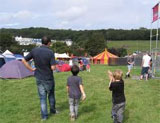 Events and festivals come in all shapes and sizes, ranging from weddings to fetes, from farmer's markets to horse shows, and from charity run to game fairs. Regardless of their nature and purpose, outdoor events always pose significant risks to life and property. The temporary nature of the activity, lack of proper planning, shortage of time, exposure to elements, open cables and electrical connections, weak structures, inadequate experience, and the crowd itself are just some of the reasons why accidents are waiting to happen at outdoor event venues.
Events and festivals come in all shapes and sizes, ranging from weddings to fetes, from farmer's markets to horse shows, and from charity run to game fairs. Regardless of their nature and purpose, outdoor events always pose significant risks to life and property. The temporary nature of the activity, lack of proper planning, shortage of time, exposure to elements, open cables and electrical connections, weak structures, inadequate experience, and the crowd itself are just some of the reasons why accidents are waiting to happen at outdoor event venues.
Health and safety at outdoor events is such a serious concern that the HSE has dedicated a whole portion of its website to the subject - www.hse.gov.uk. Event organizers have been made legally accountable for any and all accidents taking place during the event. The Peterborough City Council has issued elaborate guidelines for event managers and organizers, which everyone arranging any outdoor event must follow in their own and public interest. Here they are, briefly.
Planning your outdoor event
You'll obviously be writing down the time, venue, and date of the event, its contents, number and age groups of people likely to attend, mode of invitation, and many other details during the planning phase. You must inform your city council about the event in writing at least 28 days ahead of the event date. When you are planning your event—a charity show, a village fete, a flea market, or anything else—make sure that you pay proper attention to all the potential hazards and make a brief written assessment of each of the objects that you and your team members think presents a health and safety risk. For instance, if you've arranged for a bouncing castle or other rides for kids, their safety assessment must be included in your plan. Electrical connections and equipments, stage structure, fire hazards, stampede hazards, people with disabilities, children, fireworks, weather,, and many other areas demand your special attention, depending upon the specific nature of your event. The combined safety assessments of all equipment and activities will constitute your safety manual for the event, which, apart from giving you a health and safety roadmap for the event, will also serve as your defence in case of any eventuality.
Organizing your event
Now that you have a written account available of everything that could pose a threat to safety during your event, it's time to organize your event on ground. You'll need to assign responsibilities for different tasks to different people. Appoint an event manager and a safety officer, apart from helpers, ticket sellers, gate keepers etc. Survey the site of the event and prepare a to-the-scale sketch of the area. It is very important to mark entry and exit routes and prepare a practicable emergency mass evacuation plan should something unforeseeable happen. Make a contingency plan listing down step in case of any and all accidents that can take place at your event, such as fire, minor or serious injury, a car crash, or a stampede. Make sure that your team members are fully trained and brief about their roles as well as the contingency procedures.
Executing Your Event
Finally, the big day is here and you reach the venue of the event full of excitement. Expect everyone to be equally excited, and as excitement can itself cause negligence or accidents, be on the lookout. Brief everyone to watch out for hazardous situations. Establish a communication network, so that everyone stays on the same grid. Entry and exit routes, hazardous equipments and activities, accident prone individuals, and all other areas where accidents are likely to occur must be monitored throughout the event. Safety equipment such as fire extinguishers, first-aid kits, ambulance, etc must be arranged for, depending upon the nature of your event.
An event can be a lot of fun when planned, organized and executed carefully. An accident or health risk can not only ruin a perfect event, but can also create legal problems for the organizers. Make sure that you gather as much information on the subject as possible. The above steps are by no means exhaustive. Further guidance can be found at the HSE website and in the Peterborough City Council's document - click here.
Festival product check list from The Workplace Depot
Posted in Expert Commentary